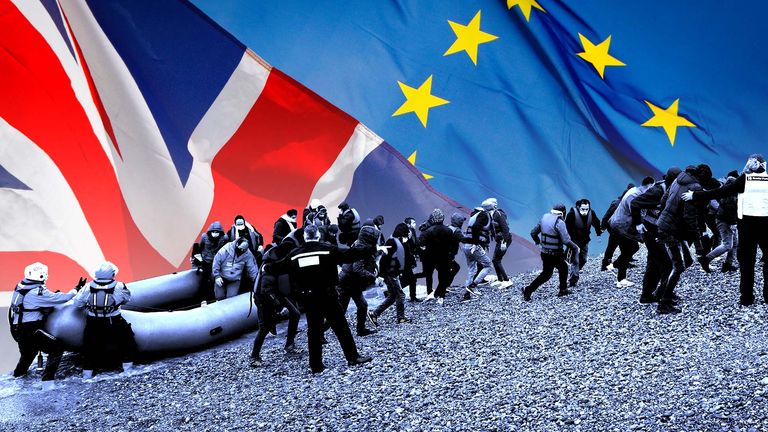
Since a few years, the EU is under an acute migration crisis, which is regulated throught the Dublin III regulation. However, meanwhile, UK citizens decided to leave the EU due to the main reasons that they wanted back the control of their frontiers. Therefore, migrants trying to escape the consequences of their application within the EU system, now try to reach the UK borders and file an application there. Nevertheless, due to a conflictual relationship and interests between the UK and the EU/France, grave incidenst occurred such as the sinking of the small boat on the 24th of Novermber 2021, resulting to twenty-seven death. By giving up their responsibility on immigration to the other parties, UK and France are devaluating the value of human lives and should focus their intention on this issue, setting aside their differents on other burning topics.
Due to BREXIT, UK gave away the opportunity to push back migrants
With the brexit entered into effect a few months ago, the Dublin regulation does not apply to the UK anymore, which includes the process of sending back migrants to the first EU country they crossed too. When a migrant reaches the UK borders it is now only a british problem not relevant for France or any other EU member states. That is why, during the last small boat’s sinking UK rejected its responsibility to rescue the migrants.
However, despite the Brexit, the Touquet agreement is still in force, since it only concern France and UK about the protection of their mutual coast lines. Nevertheless, this obligation on both parties is only an obligation of means and not of results since the french coastguards cannot prevent any migrant to cross the channel. The day of the sinking, french coastguards already stopped six hundreds seventy-one migrants. This agreement does not foresee any clause on pushing back migrants reaching the english borders to France. Therefore, by giving up the Dublin regulation advantages, the UK needs to find an agreement with France to regulate this point, in order to guarantee a smooth cooperation.
A tensed UK/ France relationship compromising any chance of agreement
In order to be willing to seat at a same table and be able to negotiate with its counterpart, UK and France need a healthy relationship. However, in addition of the conflicts link to the fishery licence, agreement on northern Ireland and Aukus Alliance, UK’s prime minister accused France for the boat sinking and gave some advices on how France shall fulfill its obligations under the Touquet agreement. For example, according to Boris Johnson, to save lives the technology used to detect migrants on sea shall be improved, they shall increase their reciprocal maritime patroles and intelligence sharing. Those points could be accepted by the french government but not his request of join patrols on coastline, which would mean having english coastguards on the french soil. France does not seem to be closed for negotiation since it also suggested to set up a join processing centres on the french soil, where applications for asylum in UK could be examined by british immigration officiers. Thus, both sides need to ease the tension concerning other topics and remember that human lives are at stake. They both have good suggestions, they only need to hear them.
Post Brexit: the need for a new european agreement on immigration
The dilemma faced by the UK is that the brexit compainers relied on taking back control of the borders but by implementing the Brexit, UK is facing alone the consequences of the small boats phenomenon. This phenomenon increased this 2018 and become more outstanding since their point of arrival on the british coast is a small area, which is difficult now for Boris Johnson to ignore politically. Therefore, a bill has been accepted by the House of Common and need to be accepted by the House of Lords. This Nationality and Borders Bill foresees to enable UK to send asylum seekers to a safe third coutry, meaning offshore processing centre. However, no country accepted to be one of them and it could lead to human rights issue. Indeed, even if the UK withdrawed from the EU and therefore does not need to apply CJEU decision, it is still a Council of Europe state party and need to comply with the ECtHR rulings. One concerning migration is MSS v Belgium and Greece, and requires the UK to apply the distrust principle and demand from the host state to provide sufficient guarantees concerning the receiving and living conditions of the migrants once arrived in this country. Despite Brexit, the UK still is not completely sovereign on its borders and especially not on migrants lives. UK cannot face this migratory crisis on its own and need to settle a new agreement with the EU countries. However, it would represent a dichotomy of political choices because the EU cannot grant a special regime for a non-member states and the UK governement needs to keep its promises to its electorate. UK needs to take its responsibility and face reality.
BBLIOGRAPHY
BBC’ Channel migrants: What happens to people crossing to the UK?’ <https://www.bbc.com/news/explainers-53734793> accessed on the 23rd of December 2021
EDAL ‘ECtHR- M.S.S v Belgium and Greece, Application No. 30696/09’ <https://www.asylumlawdatabase.eu/en/content/ecthr-mss-v-belgium-and-greece-gc-application-no-3069609> accessed on the 24th of December 2021
Inews ‘What is the Nationality and Borders Bill? Priti Patel’s UK immigration plan explained and what it will mean’. <https://inews.co.uk/news/nationality-and-borders-bill-what-priti-patel-immigration-plan-explained-1341687> accessed on the 23rd of December 2021
Le Monde ‘Migrants dans la Manche: „La crise s’explique apr le Brexit qui agit comme un poison lent entre Paris et Londres”’ <https://www.lemonde.fr/international/article/2021/11/26/migrants-dans-la-manche-la-crise-s-explique-par-le-brexit-qui-agit-comme-un-poison-lent-entre-paris-et-londres_6103759_3210.html> accessed on the 23rd of December 2021
The Guardian ‘On Channel crossings, France is sick of UK „outsourcing” problems’ <https://www.theguardian.com/uk-news/2021/nov/26/channel-crossings-france-uk-johnson-macron-letter> accessed on the 23rd of December 2021
By The European Institute for International Law and International Relations.














